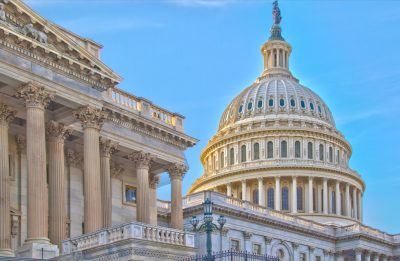Immigration at the Border

DHS’s Plan to Reform U.S. Immigration Detention System a Good Start
When I was a little girl, my mom posted a sign in our kitchen which read, “If you want to change the world, start with your own little corner.” It’s possible that Dr. Dora Schriro, author of the Immigration Detention Overview and Recommendations report released today by DHS, grew up with a similar motto. Her concise report systematically documents and critiques the legendary shortcomings and tragic consequences of America’s immigration detention system. Read More

Our Immigration System Needs Solutions, Not Villains
This week, American Apparel is slated to lay off 1,800 workers from its clothing factory in Los Angeles. The impending layoffs are the result of a federal investigation which turned up irregularities in the documents workers presented when first hired by the company. The investigation itself represents a new direction in Department of Homeland Security (DHS) immigration enforcement, one which focuses on audits of employment records rather than mass roundups and S.W.A.T.-team raids—raids which inflicted abuse and trauma on immigrants, their families and our communities. Read More

Report Shines Light on Deadly Failings of U.S. Border-Enforcement Policies
Today—on the fifteenth anniversary of “Operation Gatekeeper”—the American Civil Liberties Union (ACLU) of San Diego & Imperial Counties, and Mexico’s National Commission of Human Rights (CNDH), jointly released a report which shines a much-needed spotlight on the fatal consequences of U.S. border-enforcement policies. The report, Humanitarian Crisis: Migrant Deaths at the U.S.-Mexico Border, describes the consistent and systematic under-counting of deaths among migrants by the U.S. Border Patrol, and draws from a wide range of sources to produce its own chilling body count: 5,607 dead from 1994 through 2008—including 725 in 2008 and 827 in 2007. As the report emphasizes, these deaths are a direct result of U.S. border-enforcement policies which fail to deter unauthorized immigrants from coming to the United States, while wasting tens of billions of taxpayer dollars on symbolic and ineffective measures such as the ill-conceived U.S.-Mexico border fence. Read More

CIS’s ID Theft Argument Makes Strong Case for Comprehensive Immigration Reform
Once again, opponents of immigration reform have actually made a strong case for comprehensive immigration reform. At an event this morning sponsored by the Center for Immigration Studies (CIS), various speakers argued that ID theft by unauthorized immigrants is a problem that needs to be solved. While they seemed unwilling to offer any real solutions, the issues raised in the discussion clearly point toward the need for comprehensive immigration reform—including a legalization program for current undocumented immigrants—which would be a large and important step toward curbing the use of fraudulent documents by unauthorized immigrants. Read More

Does ICE’s Criminal Alien Program (CAP) Target Serious Criminals?
Over the past several years, ICE has increased the number of partnerships with state and local police. There has also been a new emphasis on identifying “criminal aliens” who are detained in jails and prisons, and deporting them once they finish their sentences. However, many concerns have been raised about how these programs are being implemented. In fact, various reports have shown that while ICE claims they are targeting serious criminals, the majority of persons ICE identifies and deports do not actually have any serious criminal records. Read More

The Immigration Policy Center’s Weekly News Roundup
As the Senate finance committee began mark up of their health care bill, immigration advocates went to work ensuring that legal immigrants are included in reform without unfair waiting periods and debated the inclusion of onerous verification systems in the health care system—which makes the eligibility process more complicated and even puts U.S. citizens, who are not able to provide the proper documentation, at risk. Read More

What Does a Decline in the Foreign-Born Population Mean to America and Immigration Reform?
For years now, one of the few findings you could count on in the Census Bureau’s annual statistics report was the steady growth in the foreign-born population. Other major indicators of the economy and society—like the poverty rate, or income levels, or even education trends—might go up or down, but it's been reliably true that the U.S. is a magnet for immigrants. Thus it was somewhat of a shock to see the Census Bureau report a decline in the nation's immigrant population between 2007 and 2008. The 2007 national estimate of 38.1 million immigrants fell to 38.0 in 2008. A decline of less than 100,000 people, to be sure, but a bellwether of...what? Read More

VA Town Hall Meeting on Immigration Reform Sets Debate Tone
Amid numerous reports that the Obama Administration is edging away from a timeline on an immigration reform bill, the often spirited town hall meetings have already begun. Last night, Virginia Congressman Jim Moran (D-VA) held a town hall meeting at a church in Falls Church, VA, to discuss pending immigration legislation. In a room full of more than 300 area residents and a few local groups—NAACP, Asian Americans of Virginia and the Dar Al HirJrah Islamic Center—Congressman Jim Moran said he plans to co-sponsor Congressman Luis Guiterrez’s forthcoming immigration bill and spoke of the importance of progress and the danger of ignoring the status quo. Read More

An Anti-Immigrant Hate-Fest on Capitol Hill
A motley collection of anti-immigrant zealots and talk-radio shock jocks of the far right descended upon Washington, DC, this week for an annual event dubbed “Hold Their Feet to the Fire.” The two-day marathon of angry rants on the air waves coincided with three days of lobbying visits to congressional offices organized by the nation’s largest anti-immigration group, the Federation for American Immigration Reform (FAIR). Predictably, the assorted speakers and activists in attendance at this year’s hate-fest blame immigrants—particularly unauthorized immigrants—for virtually every economic and social ill to befall the United States, and demand that Congress continue to pursue the “deportation-only” approach to unauthorized immigration that has proven to be an utter failure for more than two decades. Read More

New Report Holds Immigration Detention System Up to the Light
Transparency and oversight have never topped Immigration and Customs Enforcement’s (ICE) priority list—especially during the post-9/11 Bush administration when ICE’s detention system nearly tripled in size. Last month, however, ICE director John Morton announced a new plan to overhaul the flawed immigration detention system and broaden federal oversight. Sure, the new plan was announced shortly after ICE was forced by the ACLU under the Freedom of Information Act (FOIA) to release a “comprehensive list of all deaths in detention” (which now totals 104 since 2003), but still, John Morton’s intention to make ICE more transparent and efficient seems sincere. The question, however, is whether or not ICE will actually be able to restructure its sprawling detention system after years of scant oversight and zero accountability. Read More
Make a contribution
Make a direct impact on the lives of immigrants.
